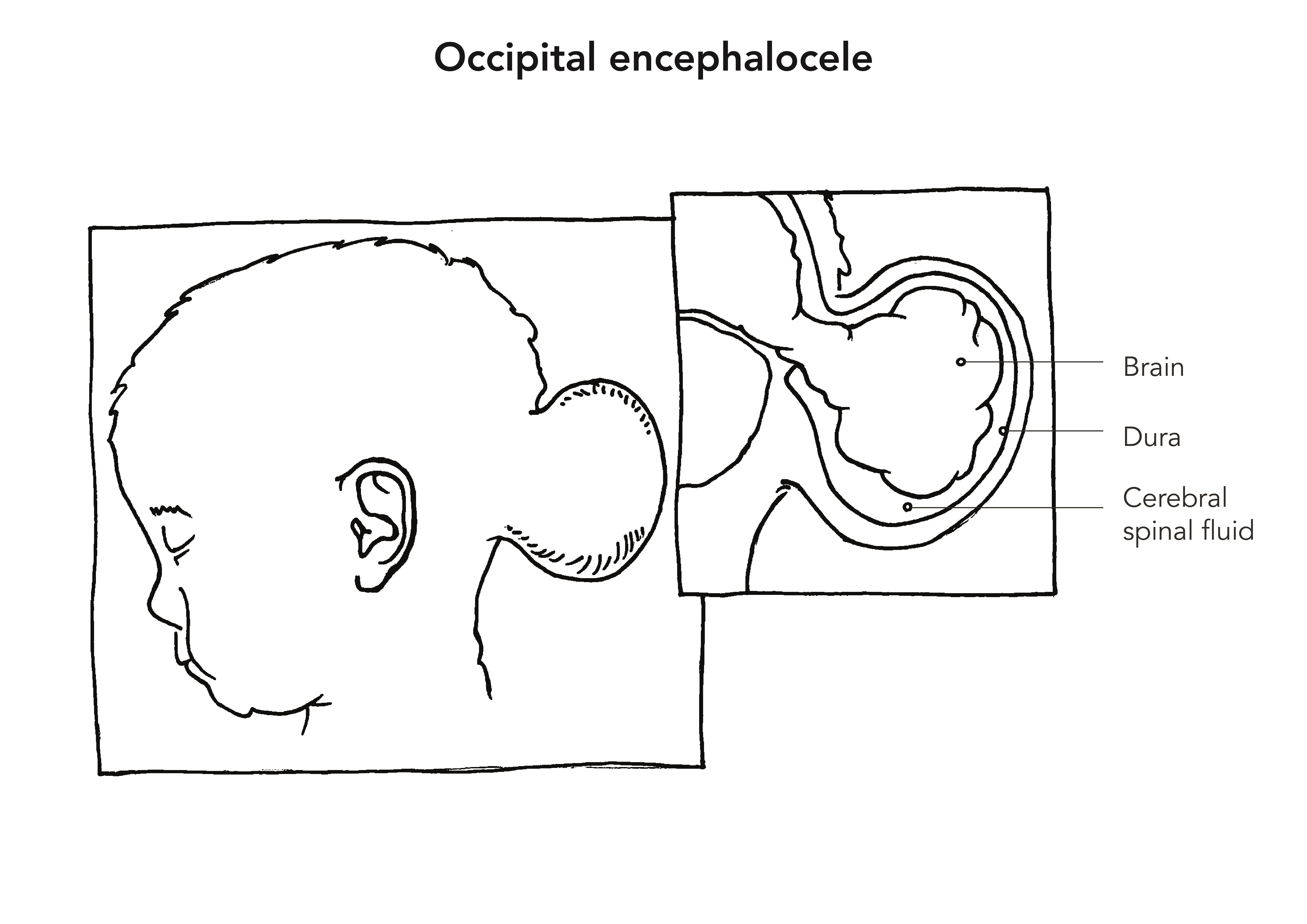Encephalocele
Encephalocele
An encephalocele is a rare congenital (present at birth) type of neural tube defect where part of the skull has not formed properly so a portion of brain tissue and associated structures are outside the skull. The protruding sac may be covered with skin or it may be covered with a thin membrane.

What causes an encephalocele?
In early development, the brain and spinal cord start as a tube-like structure called the ‘neural tube’ that is open at either end. These openings close within the first weeks of pregnancy, and the neural tube continues to grow and fold, eventually forming the brain and spinal cord.
If the tube fails to close properly, this results in a group of problems called ‘neural tube defects’. We do not really understand what causes neural tube defects in general but we do know that folic acid can reduce the risk of them happening in future pregnancies. More information about this is at the end of this information sheet.
In most cases, an encephalocele has developed sporadically (out of the blue) and is not passed on from parent to child. However, an encephalocele can be a feature of various syndromes (collection of symptoms often seen together), such as Dandy Walker syndrome, Chiari malformation or many others, which may have a genetic component.
We do know that if there is a family history of neural tube defects, there is an increased risk of having a child with an encephalocele. Encephaloceles affect between 1 and 2 in every 10,000 births.
What are the signs and symptoms of an encephalocele?
The location of the encephalocele is an important factor in the plan for treatment and outlook, as is the type and amount of brain tissue outside the skull. Very large encephaloceles may be incompatible with life so affected babies may not survive pregnancy.
The symptoms present with an encephalocele are very variable. Hydrocephalus occurs when cerebrospinal fluid (CSF) builds up within the ventricles (cavities) of the brain resulting in increased pressure on the brain. The portion of the brain tissue being outside the skull reduces the CSF flow. CSF is a watery liquid that surrounds the brain and spinal cord, acting as a ‘cushion’. It also supplies nutrients to the brain.
Some children show some signs of developmental delay, that is, they reach their ‘milestones’ such as sitting, crawling or walking, later than other children of a similar age. They may be smaller than children of a similar age as well. They may have learning disabilities which continue throughout life. Other children have seizures (fits or convulsions) or visual impairment.
How is an encephalocele diagnosed?
If the encephalocele is large, it may be seen on routine prenatal ultrasound. You will then be referred to the fetal medicine specialist team who will perform an ultrasound scan and talk to you about the possible causes and outlook for the baby.
The outlook is variable depending on the location of the encephalocele and the amount of meninges/brain tissue outside the skull. It will also depend on any other problems present and if the encephalocele is part of a syndrome.
The outlook for a proportion of children with an encephalocele is good with few long term effects on bodily functions such as breathing, vision and hearing. Children with learning disabilities will benefit from support in education and day to day life although a degree of independence may be possible. The majority of children with no learning disabilities grow up to lead a normal life, working and raising a family.
There is now evidence that an adequate intake of folic acid can dramatically reduce the risk of encephalocele occurring in future pregnancies. If someone is planning a further pregnancy, we recommend they take 4mg of folic acid each day for at least three months before conception and for the first three months of pregnancy. This dose is higher than the standard recommendation for women who have not previously had a child with a neural tube defect. If you have any concerns about future pregnancies, please talk to us as we can arrange a consultation with a genetic specialist for you.
More information
SHINE is a charity for neural tube defects
Antenatal Results and Choices is a national charity that can offer support to parents who have been diagnosed with a fetal abnormality
